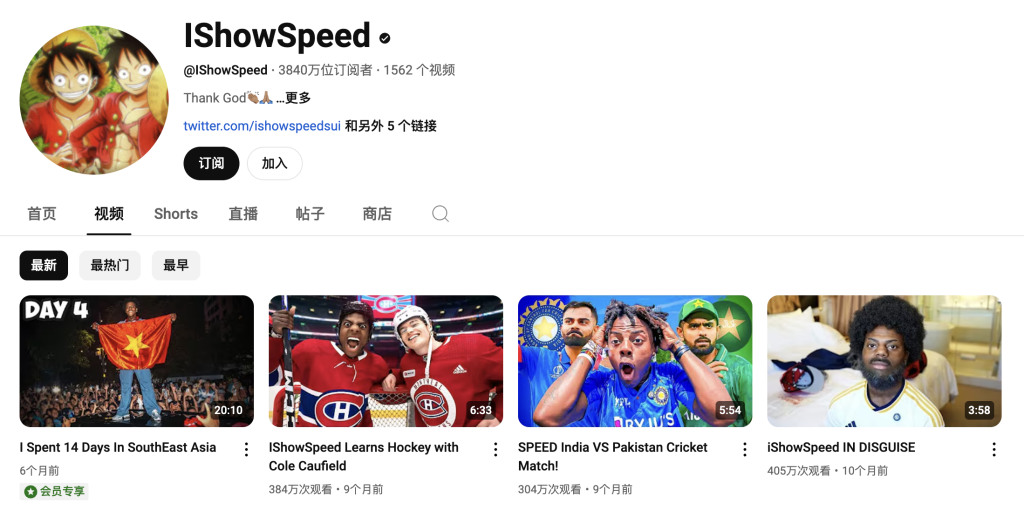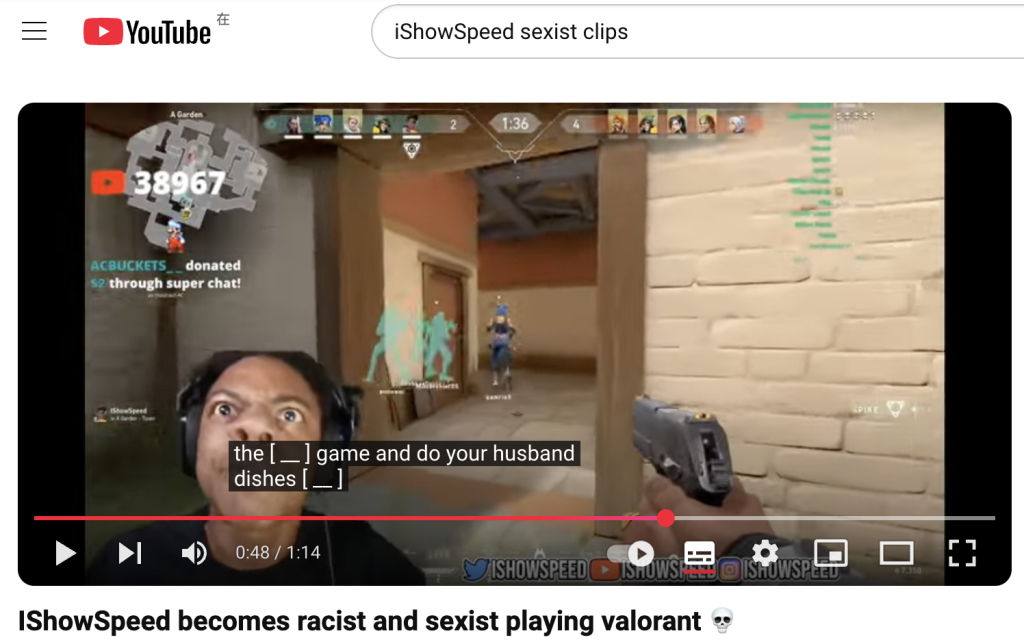
In the digital era, hate speech and online harm have become an inevitable topic. From social media platforms to livestreams, from news content to gaming communities, hate speech is everywhere. “Black people are born criminals.” “Women should stay at the kitchen.” “LGBTQ+ are all psychopaths.” Imagine waking up one morning and find that social media is full of these kinds of message.So online hate speech is not only negative text, it is also corrosive text.It suppresses voices, fosters discrimination, and even fuels real-world violence.
In March 2025, the top American influencer IShowSpeed’s Chinese travel set off a phenomenon discussion on the Internet. He presented China to a global audience through his marathon six-hour livestreams, characterized by exaggerated expressions and a wildly crazy style. With over 30 million subscribers on his YouTube channel, he is undoubtedly an internet superstar.During one livestream, a child said, “Messi is trash.” He immediately shook the kid’s hand and replying, “Yes, yes!” While IShowSpeed is a big fun of Cristiano Ronaldo, making this seem like typical fan rivalry.It raises a more serious underlying problems.When the boundary between entertainment and hate speech becomes blurred, how should platforms, audiences, and content creators respond?
What is hate speech? What’s the different between jokes and hate speech?
According to Terry Flew, hate speech has been defined as speech that expresses, encourages, stirs up, or incites hatred against a group of individuals distinguished by a particular feature or set of features such as race, ethnicity, gender, religion, nationality, and sexual orientation’.Its main characteristics include targeting specific groups, stigmatizing targets, and depriving target groups of their dignity and rights.A lot of hate speech is often disguised as “jokes” or “entertainment” .For example, IShowSpeed has repeatedly used racial slurs during his live stream, yet fans defended him saying “He was just joking.” He has been criticized as racist for imitating an Asian accent, but some viewers thought it was just for fun. So we have to make a very clear distinction between jokes and hate speech. Is there any intention to incite confrontation? Does it lead to real-world attacks or discrimination? What are the differences between certain words in different contexts?The purpose of a joke is to entertain and usually through a harmless way. Both parties can laugh, and it does not target the inherent traits of a specific group.
IShowSpeed’s controversial history
Racial discrimination controversy
In many occasions, IShowSpeed used the N-word—a deeply offensive word that against Black people during his livestreams.During one time, he repeatedly played and emphasized the word while listening to a completely non-discriminatory Chinese song. On the surface, he appeared very angry, misleading some viewers to assume he believed the song itself was racist. However, if he was truly aware of the severity of the words, why did he deliberately repeat it? Was this an unintentional mistake, or a orchestrated move to spark controversy and gain attentions from audiences?So this raises several serious questions:”Can pretending stupid excuse the harm caused?””Should platforms allow such behavior under the guise of ‘entertainment’?””Will young fans imitate his actions, regarding it as a form of humour?”
Sexist remarks
During a heated gaming livestream, IShowSpeed aggressively shouted, “Bitch, go home and wash dishes for your husband! Shut up!” Then repeating the words for multiple times. Although he later argued that it was just the effect of the show and it was emotions that led him to say such sexist words.Yet, as an influencer with millions of followers, such statements:Regarding sexist words as “just jokes” makes misogyny seem acceptable. Fuelling gender conflicts online, which will further reinforcing stereotypes of gender.Setting a negative example-can hate speech become justified simply due to it is said with personal emotions like anger?

LGBTQ+ related controversies
In one video, he once joked with another man that “Whoever moves first is gay.” It appeared to be a joke, but it was actually discriminatory against the LGBTQ+ groups.This kind of “joke” reflects profound social issues.Firstly, it reinforces the stereotype of LGBTQ+ groups,stigmatizing homosexuality is a negative thing which need to be avoided.Secondly, the word means spread homophobic ideologies among young viewers so they will imitate it unconsciously in their real life. What’s more important is that it will make LGBTQ+ groups fell marginalized and offended in public spaces.We all need to think deeply about it.

Bad effects of IShowSpeed
Firstly, IShowSpeed’s behavior will make a negative effect on younger viewers like leading them imitating the inappropriate remarks. IShowSpeed’s audience is mainly young people, who are still in the formation stage of values and norms of behavior. His words of sexist, racist, sexual harassment and other clearly offensive language is often packaged as a “joke” or “show effect” and the interaction between fans is often filled with the same crude imitation. As a result, this unconscious culture of hatred and discrimination has been replicated and spread, lowering the standards of behavior across social networks and teaching teenagers a wrong value: as long as you are exaggerated and outrageous enough, you can get attention and applause without taking responsibility for your words and actions.
Secondly, IShowSpeed’s success has led to a toxic circle of “controversy is traffic.” Platforms tend to be tolerant facing the content creators like IShowSpeed who bring in a lot of viewers and buzz. Even if their behavior breaks community rules, they will just receive a tiny punishment. This certainly creates a wrong guidance.On digital platforms, as long as you can create a conversation, even if it involves insults, harassment or hate speech, it can be tolerated or even rewarded. This logic has gradually eroded the public nature of the Internet, encouraging more and more content creators to seek eyeballs in more extreme and offensive ways, forming a vicious competition.
Thirdly, IShowSpeed’s misconduct weakens the victims’ living space in the online environment. In the case of his abuse of a female player Ava, although Speed eventually apologized briefly and was partially banned by the platforms, his huge fan base mobilized to harass and attack Ava, attempting to shift the blame onto the victim. This process not only re-harms the offended person, but also enables more Internet users, especially women users, fearful and hesitant to express themselves and participate in the public discussion. This silencing effect is one of the most profound harms of hate speech.It reduces the diversification of the Internet and leading a single and aggressive narrative.
YouTube’s policy on hate speech
As the world’s largest video-sharing platform, YouTube has established clear Community Guidelines, which include rules on hate speech:Hate speech based on race, religion, gender, age, disability and other identity characteristics is not permitted.Incitement to violence or discrimination against particular groups is not permitted.Content that glorifies or promotes hate groups is not permitted.However, there are serious shortcomings in the actual implementation of the platform. For example, language barriers, diverse cultural backgrounds and unequal distribution of resources have led to a large number of illegal content not being identified and dealt with in a timely manner. Although YouTube claims to use a dual mechanism of artificial intelligence review and manual review, in specific practice, there are still problems such as selective enforcement, vague standards, and unclear boundaries.
The Platform’s Dilemma: Data Traffic vs. Responsibility
Behind highly controversial Internet celebrities such as IShowSpeed lies the fundamental dilemma faced by social media platforms: prioritizing traffic growth or fulfilling social responsibility? From a business perspective, the platform relies on head creators such as IShowSpeed to attract users and boost advertising revenue. Because his livestreams often have millions of views, the algorithm naturally continues to recommend his content, creating a “traffic black hole.” But the hate speech and discriminatory content wrapped in entertainment in his videos were treated with a blind eye by the platform, which means the platform effectively becomes an accomplice to violent speech.
There still exists flaws in the content review mechanism of the platform. Firstly, the algorithm favors extreme content. Because controversial statements are more likely to trigger strong emotions, which increases user time and advertisement exposure. Secondly, the moderation standards are vague and inconsistent.Many hate speech is under the cover of “jokes” “irony” or “program effects,” and platforms often choose not to act for fear that “excessive censorship” will trigger a backlash from creators. For example, IShowSpeed repeatedly used racial slurs, but YouTube only suspended him for a short period of time rather than permanently banning him. Even more ironically, his livestreams still makes money through advertisement sharing, which means that the platform makes money while condemning violations.
This approach exposes the hypocrisy of platform governance.They have the ability of regulation, but unwilling to sacrifice commercial interests. The platform strictly regulates ordinary users, but when it comes to top content creators such as IShowSpeed, the punishment is significantly reduced. It is hard not to question whether the rules of the platform are set for everyone, or only for “small creators”.So in order to break this impasse, platforms must make a clear choice about whether they should establish more transparent review mechanisms and truly have zero tolerance for content that incites violence. Otherwise, when entertainment becomes a fig leaf for hate speech, everyone ultimately becomes a victim.
What should the audiences do?
The reason why the controversial Internet content creators like IShowSpeed can continue gain attention from viewers, in addition to the problem of platform supervision, there is another key factor: the choice of the audience. As Neil Postman wrote in Amusing Ourselves to Death,when all public discourse is presented in the form of entertainment, people gradually lose the ability to think about serious issues. Today, this prediction is coming true.Many viewers are not only not resisting hate speech and discriminatory content, but are happy to click “like”, share, and even participate in it.
So how did the audience become accomplices? Firstly, the “just kidding” mentality. Many people think that extreme comments on the Internet are “Just for show effect.” and “Don’t take it too seriously.”, but they ignore the impact of these comments on the real world. For example, fans of IShowSpeed parodied his discriminatory language to attack others, resulting in victims being subjected to online violence. Secondly, the spectator culture. Compared with common comments,hate speech is often more dramatic. The audience regards online abuse wars and inflammatory remarks as a show, and the spectators will not cause loss to their own interests, so they even expect more extreme words and deeds.This is called”watching costs nothing.”
So what should the audiences do? Firstly,viewers should stop engaging.Refuse to like or share discriminatory or inflammatory videos, to avoid further promotion of the algorithm. Do not follow streamers who are always skirting or overstepping their boundaries. Secondly,audiences should take the initiative to report rather than ignore. Forcing the platform’s audit system to take action. In addition, when hate speech appears in a video or live stream, they take the initiative to speak rationally in the comments section, rather than continue to fuel the fire with inflammatory words.Let the algorithm recognize “healthy interactions” instead of extreme emotions.Finally,audiences should deliver the right values to the people around us. Many of IShowSpeed’s fans are underage and prone to mimicking the behavior of influencers. Therefore, we must take the initiative to spread the correct value and guide the public to distinguish the boundary between “entertainment” and “harm”.
Conclusion: Entertainment should not be a fig leaf for hatred
The case of IShowSpeed tells us that when entertainment becomes a tool to harm others, we must re-examine it. When harm become jokes, prejudice become the effect of the show, the online environment totally lose its true value.The online world is not an illegal place, everyone should take responsibility. The audiences should reject these certain kind of content instead of being spectators. Platforms should build more transparent moderation,avoid vacuous standards and use the same regulations to regulate all users.Content creators also need to aware of their responsibility to be model to the public rather than spreading a wrong value.Entertainment can be funny and humorous but we must not step into the grey area between entertainment and harm.Otherwise, today’s “joke” may turn into tomorrow’s violence.
References
Flew, T. (2021). Hate speech and online abuse. In Regulating platforms (pp. 91-96). Polity.
Sinpeng, A., Martin, F., Gelber, K., & Shields, K. (2021). Facebook: Regulating hate speech in the Asia Pacific [Final report to Facebook]. Department of Media and Communication, University of Sydney; School of Political Science and International Studies, University of Queensland.
Howard, J. W. (2019). Free speech and hate speech. Journal Name, 22, 93-109.
Carvalho, P., Caled, D., Silva, C., Batista, F., & Ribeiro, R. (2024). The expression of hate speech against Afro-descendant, Roma, and LGBTQ+ communities in YouTube comments. Journal Name. Advance online publication.
Döring, N., & Mohseni, M. R. (2020). Gendered hate speech in YouTube and YouNow comments: Results of two content analyses.

Be the first to comment